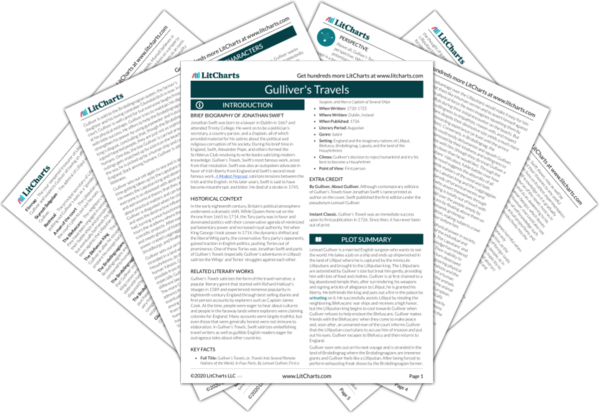Much of the novel’s plot action is driven by deceptions, and Gulliver takes note of the inhabitants’ feelings about truth and lying in every country he visits. Deceptions that drive plot action include the Lilliputians’ secret plot to starve Gulliver to death and Gulliver’s subsequent deceits to escape Lilliput. Then, in Brobdingnag, Gulliver deliberately conceals as many of his mishaps he can from Glumdalclitch in order to try to maintain his dignity and freedom. Later, Gulliver lies to the Japanese emperor about being Dutch in order to be granted passage to England. Finally, in the land of the Houyhnhnms, Gulliver deliberately avoids correcting the Houyhnhnms misimpression that his clothes are a part of his body, which helps distinguish him enough from the Yahoos to convince the Houyhnhnms he isn’t really one of them.
From society to society, Gulliver also tracks the inhabitants’ different attitudes towards truth and falsehood. The Lilliputians’ treat fraud as the highest crime and profess a rigorous devotion to honesty (which is, of course, somewhat undercut by the court’s deceptive plot against Gulliver). In Glubbdubdrib, Gulliver explores his own culture’s attitude towards truth by summoning ghosts of the past and having later thinkers show ancient thinkers like Aristotle the falsehood in their theories while also exposing rampant deception among the English royalty. In the land of the Houyhnhnms, Gulliver encounters a purely honest society, so committed to truth that its members don’t even have a word for ‘lying’ and only refer to a falsehood as “the thing which is not.”
Yet even as the novel raises earnest questions about the value of honesty, it also toys with the reader, suggesting that truth may be more subjective than absolute. As certain as the novel’s human readers are that the societies described are pure fantasy, so too do the characters that inhabit those societies refuse to believe Gulliver’s descriptions of human society and insist that Europe is make-believe. Further, Swift makes a concerted effort at verisimilitude by including the preface from Richard Sympson, which repeatedly alludes to geographical facts omitted, supposedly to prevent boredom. (Earlier editions of the novel took this verisimilitude even further by keeping Swift’s name off the book and publishing it under the pseudonym Lemuel Gulliver.) Swift also has Gulliver attest again and again to his own honesty and to the true nature of his account. Beyond insisting that it is the factual count it emphatically isn’t, Gulliver’s Travels also criticizes the novelistic form it is when Gulliver encounters the erosive influence of novels on readers’ brains. As with knowledge, then, Swift presents a mixed message on truth: while his work advocates for honesty among individuals and human governments, it also suggests that life will always contain some degree of unknowability and confusion.
Truth and Deception ThemeTracker

Truth and Deception Quotes in Gulliver's Travels
This volume would have been at least twice as large if I had not made bold to strike out innumerable passages relating to the winds and tide, as well as to the variations and bearings in the several voyages…likewise the account of longitudes and latitudes…I was resolved to fit the work as much as possible to the general capacity of readers.

Unlock explanations and citation info for this and every other Gulliver's Travels quote.
Plus so much more...
Get LitCharts A+They look upon fraud as a greater crime than theft, and therefore seldom fail to punish it with death.
It was a custom, introduced by this prince and his ministry…that after the court had decreed any cruel execution either to gratify the monarch’s resentment or the malice of a favorite, the emperor always made a speech to his whole council, expressing his great lenity and tenderness, as qualities known and confessed by all the world…nor did anything terrify the people so much as those encomiums on his majesty’s mercy; because it was observed that, the more these praises were enlarged and insisted on, the more inhuman was the punishment, and the sufferer more innocent.
…you have made a most admirable panegyric upon your country; you have clearly proved that ignorance, idleness, and vice are the proper ingredients for qualifying a legislator; that laws are best explained, interpreted, and applied by those whose interest and abilities lie in perverting, confounding, and eluding them. I observe among you some lines of an institution, which in its original might have been tolerable, but these half erased, and the rest wholly blurred and blotted by corruptions.
I was chiefly disgusted with modern history. For having strictly examined all the persons of greatest name in the courts of princes, for a hundred years past, I found how the world had been misled by prostitute writers, to ascribe the greatest exploits in war, to cowards; the wisest counsel, to fools; sincerity, to flatterers; Roman virtue, to betrayers of their country…
He replied, “that I must needs be mistaken, or that I said the thing which was not;” for they have no word in their language to express lying or falsehood. “He knew it was impossible that there could be a country beyond the sea, or that a parcel of brutes could move a wooden vessel whither they pleased upon water. He was sure no Houyhnhmn alive could make such a vessel, nor would trust Yahoos to manage it.”
I could, perhaps, like others, have astonished thee with strange improbable tales; but I rather chose to relate plain matter of fact, in the simplest manner and style…











